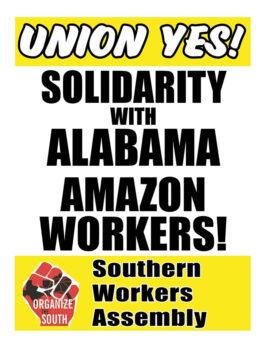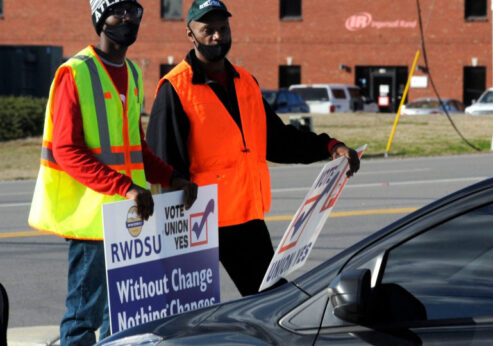
Sometimes a fight at one particular workplace can be so important that workers and their allies everywhere need to take notice. The struggle going on right now at the Amazon warehouse in Bessemer, Alabama, is one of those fights.
From now until March 29, nearly 6,000 employees at the Amazon order fulfillment and processing center in this former steel city are voting by mail on whether to unionize with the Retail, Wholesale, and Department Store Union (RWDSU).
If they win, their victory could signal the beginning of a breakthrough to organize the corporate giants that dominate the digital economy and reverse racist, anti-union laws. It’s a potential game-changer.
Amazon’s dirty deeds

No Amazon facility anywhere in the U.S. has a union, and the company is doing everything it can to make sure Bessemer isn’t the first.
Harassing texts blow up employees’ phones five times a day. Wall-to-wall propaganda posters badmouth the union. Traffic light timing outside the warehouse was shortened, leaving union canvassers fewer seconds to talk to employees leaving work. Constant meetings are held to enforce the idea that the union is a greedy outsider eager to get its claws on workers’ paychecks.
A slick company website claims a union “is a business that makes money from dues.” It says unions don’t bring better wages and benefits. Improving “service to our customers” is offered as the only way to make life on the job better and more secure.
Workers can’t even escape the anti-union message when they’re sitting on the toilet; company flyers urging a “no” vote are plastered in every stall. Amazon pulled a Trump move when it tried to block workers from voting by mail, saying they had to show up in person for crowded voting on their own time. (Luckily, the National Labor Relations Board stepped in to nix that one.)
Why Amazon workers need a union
The warehouse in Bessemer is a new one; it only opened in April 2020. But in the months since then, workers have gotten the full Amazon experience. The ridiculously low $2-an-hour hazard pay they’d been getting at the beginning of the pandemic was stripped away by June—even as CEO Jeff Bezos added $75 billion to his wealth during the crisis, making him the world’s richest man.
Coronavirus has been tough on Amazon workers, with social distancing all but impossible in the warehouses. The company admits 20,000 employees contracted COVID-19 last year, although the real number is certainly higher. No one knows for sure how many have died.
When employees at a warehouse in Staten Island, N.Y., walked out last March to protest unsafe working conditions, management retaliated by firing Christian Smalls, a worker who blew the whistle on the “lack of safety protocols.”
In Shakopee, Minn., another worker, Farhiyo Warsame, was terminated in October for complaining about the lack of personal protective equipment and forced speedups as the holiday season approached.
The problems go far beyond hazard pay and workplace safety, though.
Part-time grocery workers at Amazon’s Whole Foods division saw their health insurance stripped away from them just before the pandemic hit. Last summer, when Black Lives Matter protests rocked the country, Whole Foods workers who wore buttons showing their support for the movement were fired—even as Amazon, like other corporations, put on a big public show of backing BLM. Time off for Muslim holy days has reportedly been denied to warehouse packers in the Twin Cities, most of whom are Somali refugees.
And in February of this year, the company was hit with a $62 million-dollar ruling by the Federal Trade Commission for stealing tips from Amazon Flex delivery drivers. Rather than passing on the gratuity customers had been leaving for drivers on the app, Amazon took the money for itself. It was nothing but a case of flat-out wage theft.
A potential game-changer
Winning a union at the Bessemer warehouse will bring immediate benefits to the workers there. They will finally have a voice when it comes to outrageous work quotas and speedups. With a union contract, a worker safety committee could be established to negotiate the highest safety standards and protocols for the warehouse.

The company could no longer fire people “at will” if they complain about problems on the job; instead, management would have to prove alleged policy violations and justify firings or discipline procedures. Workers would have a grievance procedure to fight back against the kind of retaliatory terminations and restrictions that have taken place at other warehouses.
With a collective bargaining procedure in place, workers would be able to negotiate together for their wages and benefits—and hopefully make a dent in some of the massive inequality generated by Amazon.
But the importance of a victory at Bessemer goes beyond just this one warehouse. If employees here can win, it could have an impact for hundreds of thousands, even millions of other workers.
This company is one of the largest players in the new digital economy, having its hands in everything from online retail to grocery stores to logistics and delivery to cloud services and web hosting. It is also one of the most anti-union companies around. A breakthrough at the Bessemer warehouse would potentially open the gates to organizing hundreds of other workplaces—checking the so-far unchallenged power of Bezos and the billionaire class.
This is not just a labor struggle alone, however. The battle in Bessemer is also a civil rights fight. Nearly 85% of the people who work at this warehouse are Black—in a right-to-work state in the heart of the old Confederacy.
Stuart Appelbaum, leader of the RWDSU, described conditions in the warehouse as being akin to technologically-enabled slavery in a recent conversation with the Independent Media Institute. “People are being dehumanized and mistreated by Amazon,” he said. “People get their assignments from a robot, they’re disciplined by an app on their phone, and they’re fired by text message. Every motion they make is being surveilled.”
If the workers in Bessemer can do it, workers at other Amazon facilities—and at Walmart stores, fast food restaurants, on Uber apps, and in all manner of jobs—will be inspired to stand up and demand their own voice. Workers in other so-called “right to work” states would see they, too, can beat racial division, organize together, and win.
That’s why the struggle of the Amazon workers in Bessemer deserves as much support as we can give it. Attend a solidarity rally at an Amazon facility or Whole Foods grocery store near you. Spread articles about the Bessemer campaign on social media. Share information from Bamazonunion.org, the workers’ website, and from MakeAmazonPay.com, the international coalition taking on Bezos and his tax-dodging.
Bessemer could be the link that moves the whole chain, sparking a qualitative shift for the whole labor movement. We all have a stake in the struggles of these workers, and they need our solidarity. The lengths Amazon is going to in order to stop them proves it.
FEB. 20 – NATIONAL DAY OF SOLIDARITY WITH ALABAMA AMAZON WORKERS
> Solidarity actions are being planned across the South and the U.S. on Saturday Feb. 20 at Amazon facilities (warehouses, distribution centers, Whole Foods, etc.). Find an action near you.
> Download a PDF of this People’s World article to print and distribute at your local action.












Comments